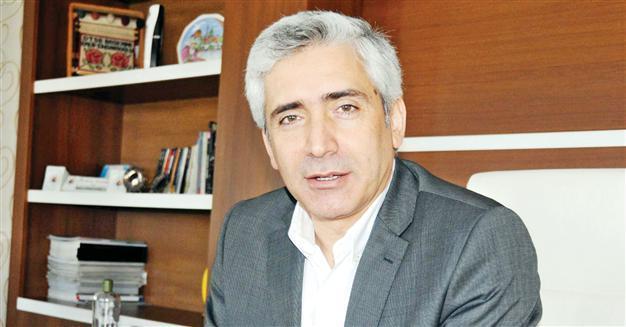AKP to abolish political immunity?
ANKARA - Hürriyet Daily News

AKP Diyarbakır deputy Galip Ensarioğlu has clearly said he will give a dissenting vote if necessary. DHA photo
Following Prime Minister Recep Tayyip Erdoğan’s remarks with regard to abolishing political immunities, politicians have focused on the matter with a great interest. Will the Justice and Development Party (AKP) abolish the immunities of the Peace and Democracy Party (BDP) deputies?
Upon Erdoğan’s insistent remarks on the subject, the AKP has initiated legal work on how to approach the BDP deputies. This work will be submitted to the Prime Minister Erdoğan, after which his decision will be implemented. The AKP has three possible options: postponing the files until the end of the electoral period, as was done in previous years; starting work on the files and extending it over a certain period of time; or taking the files of the 10 deputies - or all of the BDP deputies - to the General Assembly.
Formulas on immunitySince the AKP wants to relate the abolishment of political immunities to certain criteria, it has focused on the option of “provoking violence and terror.” A formula was thus adopted that suggests the abolition of the immunity of a deputy who has committed these crimes at least three times. If Erdoğan approves this option, the files will be negotiated in the joint commission and it will then be sent to the General Assembly. The General Assembly could make a decision with an absolute majority, as the Nationalist Movement Party (MHP) also favors the abolishment of immunities. The Republican Peoples’ Party (CHP), on the other hand, proposes abolishing the immunity of all members, except for chairpersons. In any case, the number of AKP members in Parliament is more than enough to abolish immunities anyway.
The AKP is also conducting a “political” discussion within itself, with conflicting views on the immunity matter. Those with nationalist tendencies support Erdoğan’s recent remarks and favor abolishing the immunities of at least these 10 deputies immediately.
They also oppose the move to grant the right to defense in mother tongues, which is expected to be passed by the General Assembly this week.
On the other hand, some AKP deputies of Kurdish origin are strongly against the abolition of immunities. Diyarbakır deputy Galip Ensarioğlu, for instance, has clearly said that he will give a dissenting vote if necessary, while many have implied that they will not attend such a vote.
However, the fact is that not only those AKP deputies of Kurdish origin are against the move. Along with them, many deputies and party authorities within the AKP have the same concerns, the argument being that it would harm the AKP’s support in the eastern and southeastern regions and may create further tension within the country. “If we abolish the immunities, our position in the region may be harmed. It might increase BDP votes in the region,” an AKP authority said.
Due to these concerns, the AKP is going over the matter very carefully during the process. Erdoğan previously uttered a number of remarks on issues such as reinstating capital punishment and abolishing state theaters, but concrete steps with regard to them have not since been made. So, it is being whispered in the corridors that the AKP may move to extend the reviewing of the files for a certain period of time. The party may then revise the situation in the new year, as long as the BDP or the PKK do not engage in activity that would reverse the process. Turkish politics is entering another critical phase this week.
MHP PROPOSES ARMY ‘STEP BACK’
The ruling AKP prepared a motion suggesting that the General Staff be dependent on the National Defense Ministry as part of the work on the new Constitution. During the previous week, the MHP also made a surprise move by presenting a similar motion titled “soldiers to take one step back.” The MHP based this proposal on the grounds of “normalizing the country and excluding the Turkish Armed Forces from politics.” The BDP also argued for a similar motion. We will see what the CHP, which has not yet made an explicit move, says about it.
REPORTS DON’T SATISFY OPPOSITION
Parliament’s Coup and Military Memorandums Inquiry Commission presented its report to the Parliament. However, the CHP and MHP claimed that the report was incomplete on the grounds that it avoided the details of the Sept. 12, 1980 military coup, mostly focusing on the Feb. 28 process, and did not clarify the Dolmabahçe meeting. Some commission members from the CHP even went one step further to claim that the report favors the right-wing. The Human Rights Uludere Sub-Commission will also announce its report this week, which is not expected to cover a concrete accusation against an authority. It seems as though Parliament’s latest reports have not satisfied the opposition.
